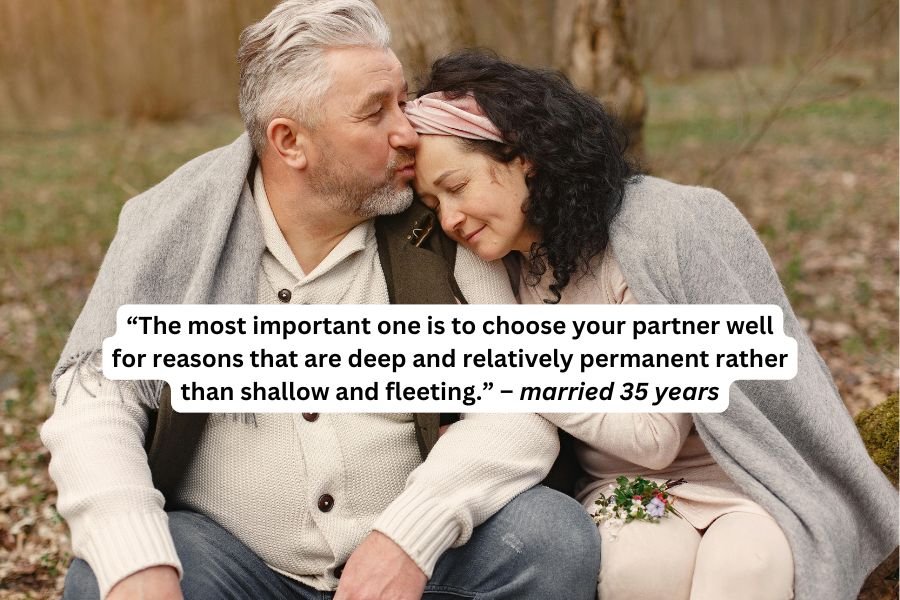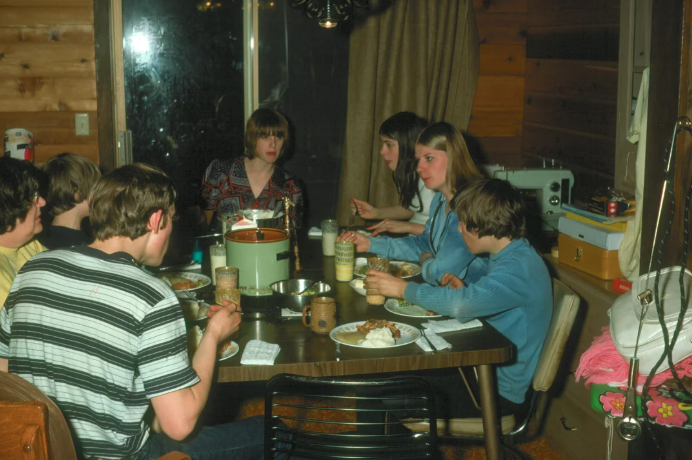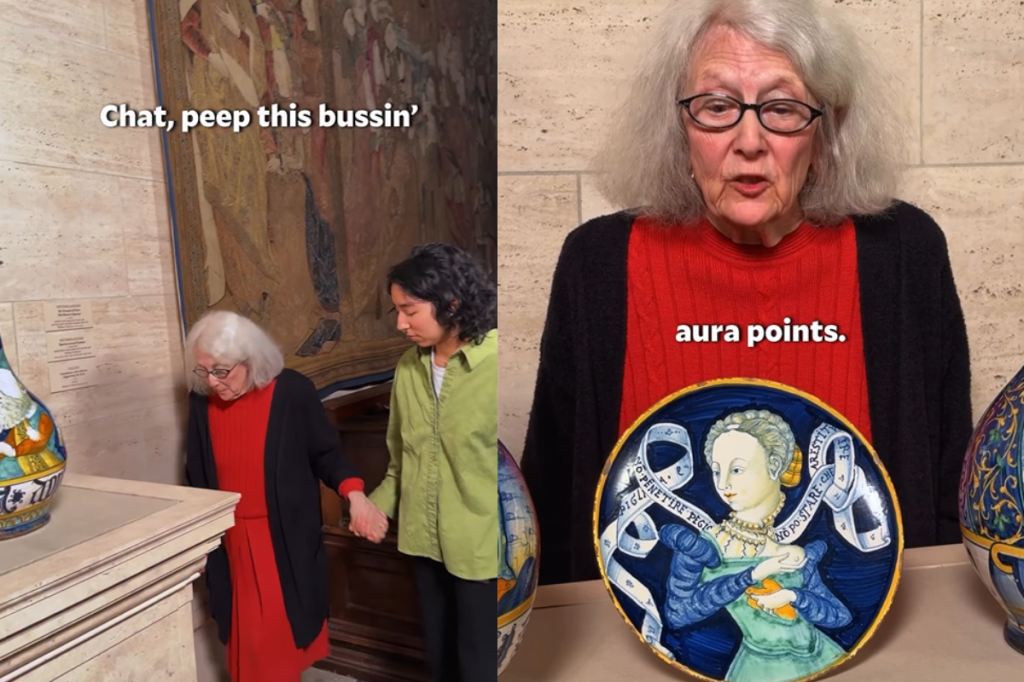No one goes into their wedding day thinking that their marriage won’t last, but as we all know, “happily” doesn’t always mean “ever after.” Some marriages start off strong and fizzle out over time. Some people choose the wrong partner to begin with and end up divorcing. Some go through major life upheavals that they aren’t able to overcome as a pair.
But some couples live the dream, not only staying together for the long haul but truly living happily ever after. That’s not to say they don’t have their share of challenges or that their relationships are perfect, but long-term, happy marriages really do exist.
People often want to know what the “secret” is to a good marriage that lasts. What is it that these couples do or don’t do to stay together for life in marital bliss?
Researchers like John Gottman have formally studied and analyzed relationships, sharing key elements that can make or break a marriage. But it’s also good to go straight to the source—couples who are still married and happy decades after tying the knot—to hear what they have to say. Every individual and every couple are unique, of course, but when you hear similar things from happy old couples over and over again, it’s a pretty safe bet that their wisdom is sound.
The AskOldPeople Reddit page has fielded various versions of the question, “What’s the secret to a long and happy marriage?” several times. Here are some answers from people who’ve been married between 25 and 52 years:
“Marry someone who has the same basic values. Hobbies, interests and style will match over a while. Cleanliness, greed, jealousy, pettiness, … will never change. This is character. So don`t believe that you can train this. You have to find a partner that matches with your core values. Family, friends, lifestyle.” – 32 years
“Marry someone you really, really like. Because if you’re doing life together, you’re going to go through a lot of shit. So much shit, y’all. You’ve got to have a partner who you genuinely love seeing walk into the room at least 90% of the time. It’s been 32 years and I still smile when my partner shows up.” – 32 years
“The three main ingredients to me are Love, Respect and Commitment. if any one of the three are missing, yer screwed.” – 47 years
“Don’t let the small things bother you. Everyone has moods, but don’t take it personally. When we were first married I used to try and get my husband to talk through everything. I finally learned to just let him be for a while. In time, he’d usually come around and talk things through. Sometimes he wouldn’t, but that was okay. Be respectful, admit when you’re wrong, and be there for each other. Also, have outings with your friends alone and together. Everyone needs and deserves time to be with their friends. Divide up household chores (this is one area we still have issues with) and realize, at times, you may have to do more and vise versa.” – 36 years
“We met when we were 16 and married 6 years later. During that time we got to know each other very well and agreed on common values by the time we got married. I have to say, we’ve never had a conflict on finances, religion, raising of children, education or any other major topic that surfaces during marriage. I trust my wife in every way as she does me. It seems to have worked for us.” – 50 years
“Marry someone you both like and love. Make sure they feel the same about you. Respect, understanding, good communication are also key. Common life goals and values are a must. Make sure you have fun!” – 25 years
“Shared values, (shared faith helps), respect for each other in all things. We may not always agree on everything, but we have great respect for each other. Avoid criticism and blaming. If a serious issue has been talked out and settled, leave it in the past. Don’t throw it back up at someone months or years later. Communicate, don’t harbor resentments. If something is an issue, address it head on and negotiate a mutually agreed upon solution. Have a plan about finances. We do not make major financial decisions without consulting the other…And we make each other laugh, we have fun together. if you aren’t laughing and having fun together, then you need to figure out why and fix that immediately. marriage is work, but its also fun, rewarding, exciting, fulfilling, and sexy!” – 44 years
“Luck in picking a decent guy at age 19 and then a lot of patience that we’d make it through the tougher times. But really it comes down to being a couple of decent human beings. It also helps a lot to be financially secure and not to have any major crises (mental illness, severely disabled child, addiction, etc) thrown at you. I’m a big fan of the the Gottmans who have done a lot of research on what makes marriages last or fail. Contempt is a killer. Actively paying attention to each other is good. And this sounds bad, but it’s sort of like what makes Finland the happiest country–reasonable expectations. If you’re looking for something out of a Disney fairy tale or some celebrity couple’s curated IG stream every day you’re bound to be disappointed. But a solid relationship where you both support each other through the ups and downs of life is a great thing.” – 52 years
“— Choose wisely. Choose someone who has the same, or at least compatible, attitudes towards sex, money, religion, raising kids, and so on.
— Have the attitude that your marriage is more important than the wants or desires of either partner.
— Never assume that you know what your spouse is thinking or that they know what you are thinking. The roughest patches in our marriage occurred when one or both of us thought that our concerns were so screamingly obvious that only malice could explain the other’s failure to address those concerns. In reality, they weren’t even on the other’s radar and they weren’t really that obvious.
— Trust your partner and give them the benefit of the doubt unless you have concrete evidence that they have broken your trust. If you are worried, say something but do it in a non-accusatory manner.” – 37 years
“There isn’t one secret, but there are many components. The most important one is to choose your partner well for reasons that are deep and relatively permanent rather than shallow and fleeting. I chose my husband because he was authentic, honest, intelligent, fun, communicative, loving, and emotionally balanced. He was comfortable with who he was in a non-arrogant way and had no pretense.
The second is having the ability to compromise when it’s important without suppressing your needs when they are important. You sometimes have to sacrifice what makes you comfortable for what is best for your future. That goes for both people. If one person is making all of the compromises, then it’s going to create big problems.
In the long run, one of the more important things is that you both keep growing and improving as people together. You should be bringing out the best in each other. Couples that bring out the worst in each other will live in increasing misery. Part of doing this is recognizing when you’ve messed up and being able to apologize and try hard to be better.” – 35 years
“The BFF aspect is real, in two senses. We are each other’s closest confidant, but the connection is between two independent people, each with our own careers, interests, and circles of same sex friends, my bros and her galpals.
Neither of us has stopped growing. We were kids when we started. We have each changed enormously over this many years. It takes nonstop work, communication, and commitment to grow together rather than apart.
As our marriage has matured, we have built a supporting infrastructure of financial stability and kinship connections with grown kids, their spouses, and now grandkids that are becoming adults. In a way, we’re not just a couple anymore, we’re the center of a whole institution.” – 57 years
Every relationship works differently, but shared values, love, respect, communication, trust, patience, compromise and choosing wisely to begin with seems to be key factors in having a relationship that not only lasts, but lasts happily. Even if you haven’t experienced it yourself, it’s heartening to know that happily ever after really is possible.


































